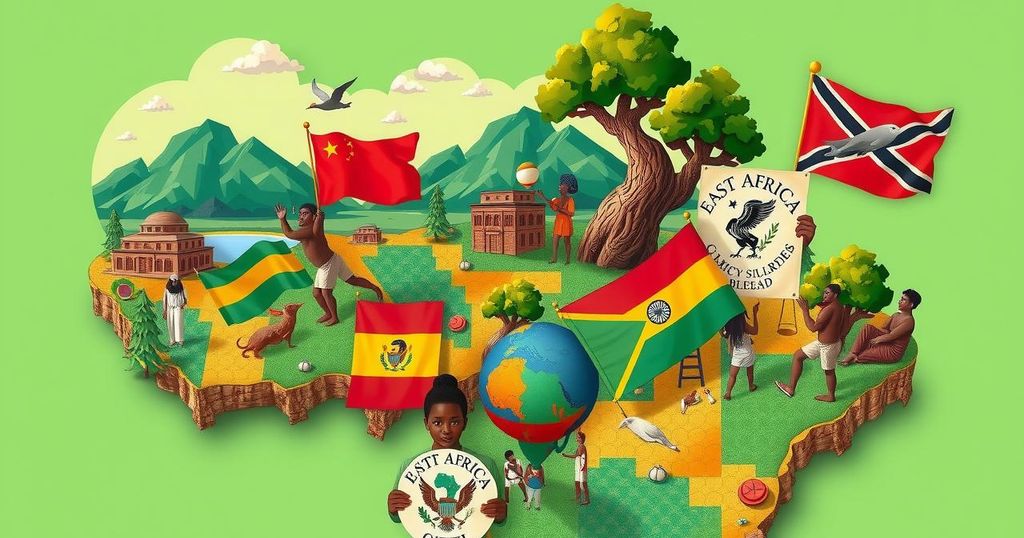Kenya-Tanzania Rift Over Activist’s Deportation Fuels Debate on Free Expression

The deportation of activist Boniface Mwangi from Tanzania has ignited a rift between Kenya and Tanzania, leading to a broader discussion on free expression in East Africa. Kenyan citizens turned to satire on social media, while Tanzanian lawmakers condemned the mockery, framing it as “imported activism.” The situation underscores the evolving dynamics of civic engagement and challenges the existing regional political structures. Leaders face pressure to adapt or cling to nationalist sentiments amid rising digital activism.
The recent deportation of Kenyan activist Boniface Mwangi from Tanzania has triggered a significant diplomatic rift, igniting debates about free expression across East Africa. Amidst accusations of “external interference,” Mwangi’s detention has raised alarms about civic space in the region, and reactions in Kenya have taken a decidedly satirical turn, with social media bursting forth with memes and impersonations targeting Tanzanian President Samia Suluhu.
What began as a straightforward diplomatic incident has morphed into something more complex, a moral challenge between the ideals of free speech and the existing fragility of regional politics. This situation occurred in the midst of Tanzanian opposition figure Tundu Lissu’s court hearings, where Mwangi’s detention appears to have the unintended effect of strengthening civic solidarity rather than quelling dissent.
In response to the internet outcry, Tanzanian legislators publicly condemned this online mockery directed at their president. Their frustration seemed less about the act of deportation itself and more about what they termed “imported activism” coming from Kenya. Notably, Geita MP Joseph Musukuma made dismissive comments about Kenya’s contributions, suggesting the country has little to offer Tanzania in terms of political influence or intelligence.
Further compounding this dialogue, Singida West MP Elibariki Kingu referred to Tanzania’s historical role as a peacemaker during Kenya’s 2007 post-election turmoil. Today, however, Tanzania’s posture appears to reflect a retreat from that legacy. Historically, figures like Julius Nyerere represented a beacon of pan-African unity, courageously engaging in regional definitions of solidarity and moral clarity. But the current government’s approach seems to suppress rather than support cross-border activism.
The dilemma now confronting East Africa is not purely about the sovereignty of states but rather about the sovereignty of ideas. The shrinking civic spaces and mounting pressures on opposition in many East African nations have brought to the forefront discussions about who has the right to voice solidarity—and in what form. In Kenya, satire, meme-making, and social media engagement have served as powerful outlets for citizen dissent, while Tanzania has clung to a more conservative and often repressive stance.
As this plays out, one must ponder the implications of meme culture and digital fervor outpacing traditional diplomatic communications. What occurs when activists and comedians become louder than official channels? This incident has starkly revealed the fragile foundations of regional cohesion. The aspirations of the East African Community for a political federation seem distant; reactions to digital activism currently lean toward suppression rather than constructive dialogue.
This moment is charged, marked not by overarching political conversations but by grassroots movements fueled through social media and collective online expression among young citizens across borders. Thus, the question remains: will East African leaders adapt to this shifting landscape or retreat further into their nationalistic strongholds? The balance of power may just be undergoing a transformation unlike any seen before.
The deportation of Boniface Mwangi has sparked a regional conversation about free expression and civic engagement in East Africa. While this incident has strained Kenya-Tanzania relations, it has also birthed a surge of solidarity through satire and social media. The responses from both sides illustrate a broader struggle between the desire for open dialogue and the inclination to resist external influences. As East Africa grapples with these pressing issues, the hypothesis remains whether leaders will embrace change or continue to shield their national boundaries.
Original Source: eastleighvoice.co.ke







